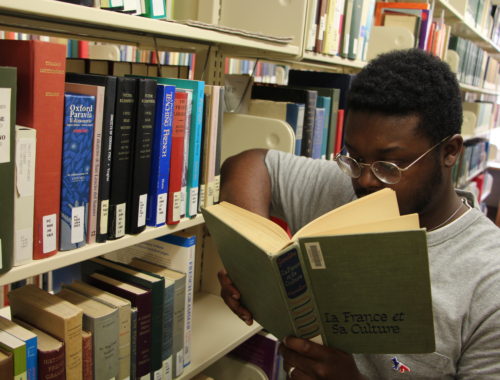
Popular Misconceptions About Learning French
There are thousands of languages spoken across the globe today, so choosing which ones to learn can be a tough decision! As two Americans who learned to speak French to fluency, we’ve noticed that just a handful of common misconceptions about studying French are often enough to steer many language learners away. We‘re here to tell you the real deal about learning French by debunking five widespread lies that you might believe about la langue française.
French isn’t a useful foreign language to learn.
Many Americans make the argument that learning French is a waste of time. What exactly makes a foreign language useful?
If utility is measured by the number of people who can speak French in the world, the estimate of 300 million French speakers is certainly convincing. French is spoken across five continents and is the official language of 32 states, further demonstrating just how many places become accessible to those who add French to their language repertoire.
If the advantages of learning a language are evaluated more abstractly, French still comes out on top. From the rich and diverse history of la francophonie, to the celebrated French tradition of fine arts, to the iconic food and drink, a whole world of culture opens up when you choose to learn French.
Ultimately, every language learner has to decide for themselves what they personally value and find useful about learning any given language, but French boasts quite a few compelling factors.
My brain just isn’t wired to learn languages.
Don’t count yourself out! If you quit language learning before you ever get started, you’ll never find out just how much you’re capable of achieving.
Though there may be biological indicators that could predict whether one will excel or struggle with language learning, nobody is doomed to be monolingual by nature of their brain. In fact, with proper technique, effort, and discipline, anyone can learn almost anything.
If you’ve decided that language learning isn’t possible for you because you’re not built for it, your assumption could become a self-fulfilling prophecy. Motivation and drive are the keys to learning new things, and constant negative self-talk is a sure-fire way to discourage yourself.
Instead of lamenting your brain’s wiring, start making a plan to study French in a way that excites you.
French is much harder to learn than other languages.
Contrary to popular belief, English speakers can learn French relatively easily.
According to the Foreign Language Institute, French is one of the easiest languages for anglophones to learn. Because languages like French, Spanish, Italian, and Dutch are all closely related to English, picking them up is pretty painless.
Moreover, if you’re an English speaker, you’ve already got a head start in learning French. When comparing French and English, there’s an almost 30% overlap between vocabularies. We bet that without a single French lesson you’re able to understand words like liberté, urgent, effort, éducation, adorable, conversation, and restaurant.
Don’t listen to the pessimists who mistakenly proclaim that French is too hard to master.
To really learn French, you need to move to the country and immerse yourself in the language.
If you’ve resigned yourself to never learning French because moving abroad isn’t in the cards for you, you should reconsider!
While in some instances immersion can help language learners improve their competency quickly, it is definitely not a necessary step to becoming fluent. In fact, following a comprehensive language-learning plan that will ensure you can read, write, and speak proficiently about a multitude of subjects beats bumbling around France without ever gaining a solid grasp on the language.
Take Jalen, for example – He learned French to fluency and obtained the highest achievable credential for French as a foreign language, the DALF C2, before ever setting foot in France.
You don’t have to have all the time and money in the world to learn French. With some willpower and the right tools, you can learn French from wherever you are.
I’m too old to learn another language to fluency.
While it’s absolutely true that language learning becomes more difficult as we age, a surprising amount of people misunderstand the science completely.
The process of acquiring our native language(s) begins early in childhood. First-language acquisition happens through input alone, meaning babies don’t need to be formally taught a language to correctly develop their skills. This aspect of human psychology leads people to believe that once you’ve acquired your native tongue(s) as a young person, you’re past your prime for language learning in general.
Though adults can’t acquire a second language the same way that native speakers of that language did, it is totally possible to learn a second language to fluency. After childhood, you may never be able to become indistinguishable from a native speaker, but speaking exactly like a native is as unnecessary as it is impractical.
If we stop conflating first-language and second-language acquisition, it becomes clear that you’re never too old to learn to speak a foreign language.
While there are plenty of reasons to learn languages other than French, these five misconceptions aren’t included! Did you believe any of these French-learning myths? How have these errors affected your language-learning journey? Let us know in a comment!
Check out our book suggestions for French learners!
Check out our video to find out how French brought two Americans together!
You May Also Like

Improve Your French Writing Now With These Simple Rules
January 11, 2023
French Music Playlist All Francophiles Will Love
December 15, 2021

